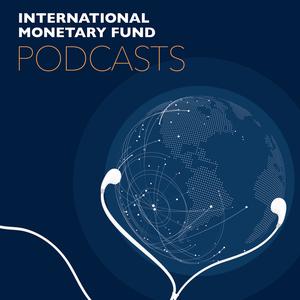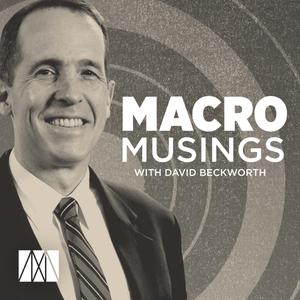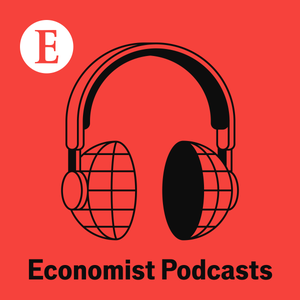
IMF Podcasts
IMF Podcasts
- 29 minutes 12 secondsPierre-Olivier Gourinchas on the Global Outlook: Steady but Slow
The World Economic Outlook is more than projected growth rates. The research behind those projections tells the story of how 190 countries, slowly but steadily, found their way through the fog of the past few years to emerge a testament to the resilience of the global economy. Pierre-Olivier Gourinchas is IMF Chief Economist and brings together the multitude of analytics, data and insight that provide the signposts. In this podcast, Gourinchas says while the fears of a global recession have not materialized, the path ahead is not without obstacles. Transcript: https://bit.ly/4b5O6x6
Read the full report at IMF.org
2 May 2024, 2:27 pm - 23 minutes 12 secondsWenjie Chen on Sub-Saharan Africa’s Latest Outlook
Sub-Saharan Africa is slowly emerging from four turbulent years with higher growth expected for nearly two thirds of countries in the region. But while inflation has almost halved and debt has broadly stabilized, economies are still grappling with financing shortages and impending debt repayments. Wenjie Chen is deputy head of the team that publishes the Regional Economic Outlook for sub-Saharan Africa. In this podcast, she says the surging global demand for critical minerals key to renewable energy systems could help the region overcome the ongoing funding squeeze.
Transcript: https://bit.ly/3WbU6iT
Read the full report at IMF.org
25 April 2024, 10:00 am - 26 minutes 42 secondsGlobal Financial Stability: Fragilities Along Disinflation’s Last Mile
As inflation slowly subsides and optimism pervades financial markets, the latest Global Financial Stability Report (GFSR) warns of potential setbacks. Fabio Natalucci and Jason Wu head the GFSR team. In this podcast, they discuss risks associated with debt and the private credit market, struggling real estate sectors in China and the US, cybersecurity, and a host of other risks to the much anticipated soft landing.
Transcript: https://bit.ly/4axvy8z
16 April 2024, 2:10 pm - 24 minutes 37 secondsKristalina Georgieva: The 2020s: Turbulent, Tepid or Transformational?
IMF Managing Director Kristalina Georgieva kicks off the 2024 IMF-World Bank Spring Meetings from the Atlantic Council in Washington, DC, with her customary curtain raiser speech. Go to IMF.org to follow the Spring Meetings and find all the IMF flagship reports, including the World Economic Outlook, the Global Financial Stability Report, and the Fiscal Monitor.
Webcast and transcript: https://bit.ly/4aRkmDg
11 April 2024, 10:40 pm - 23 minutes 38 secondsJeffry Frieden: How Politics and Economics Interact
Even optimal economic policies create winners and losers, and that’s where politics steps in. Trade liberalization is an example of a policy that can make a country better off as a whole, but what happens to workers who lose out to cheaper goods? Jeffry Frieden says while politics is often messy, it’s how society puts a value on things economists can’t measure.
Frieden is a Professor of Government at Harvard University.
Transcript: https://bit.ly/4cU34qZ
Read A Place for Politics at IMF.org/fandd
11 April 2024, 4:05 pm - 16 minutes 56 secondsSuresh Naidu: Why Labor Market Model Falls Short
For decades, the standard labor market model has been ruled by supply and demand, but a younger generation of labor economists is questioning that approach. Suresh Naidu is a Professor of Economics and International Public Affairs at Columbia University. He says while the supply and demand model is not wrong, it only tells part of the story. In this podcast, Naidu and journalist Rhoda Metcalfe discuss why today’s labor market model sometimes fails to reflect the real world.
Transcript: https://bit.ly/4aHBqvz
4 April 2024, 8:59 pm - 22 minutes 52 secondsWomen in Economics: Olivia Mitchell on Retirement Reality
It wasn’t that long ago when retiring in one’s 50s was an achievable goal. But with life expectancy steadily rising and pension systems doomed to fall short, the prospects for an early retirement are fading fast. Olivia Mitchell wrote the book on retirement and modern pension research and has spent her career helping people improve their financial literacy. Mitchell is a Professor of Economics and Public Policy at the Wharton School of the University of Pennsylvania. She sat down with journalist Rhoda Metcalfe to discuss the challenges of today’s economy for Americans planning their golden years.
Transcript: https://bit.ly/49snKUp
28 March 2024, 3:06 pm - 37 minutes 6 secondsKristalina Georgieva: The Economic Possibilities for My Grandchildren
John Maynard Keynes was one of the most influential economists of the 20th century and the father of modern macroeconomics. His novel lectures at King’s College, Cambridge, inspired economists and policymakers of the time and continues to do so a hundred years later. In this podcast, IMF Managing Director Kristalina Georgieva delivers a speech inspired by one of Keynes’ lectures to a young audience at the very same King’s College.
Transcript and webcast: https://bit.ly/3Tv4lfi
21 March 2024, 7:06 pm - 16 minutes 36 secondsUlrike Malmendier on Behavioral Economics
Economists build models based on basic assumptions of human behavior. But people are complicated, right? Do Germans who grew up on opposite sides of the Berlin Wall make the same financial decisions today? Ulrike Malmendier is a behavioral economist whose innovative research has shown that experiential learning rewires the brain to make decisions based on past experiences. In this podcast, Malmendier and Journalist Rhoda Metcalfe discuss how behavioral economics is helping to build better economic models.
Transcript: https://bit.ly/3x3sWjZ
Read New Lessons from Behavioral Economics at IMF.org/fandd
19 March 2024, 7:11 pm - 21 minutes 27 secondsPoverty’s Hidden Dimensions
Countless resources and billions of dollars have been directed at poverty alleviation over the decades and yet almost 10 percent of the world’s population is still struggling to survive... not only in developing countries but in rich countries too. Why do so many anti-poverty efforts fall short? Martin Kalisa says there is more to poverty than income, and poor people can help design projects that are more likely to succeed. Kalisa is the Deputy Director of ATD Fourth World, an anti-poverty organization that builds research teams that include poor people to better understand their needs. Kalisa took part in a conference on the Hidden Dimensions of Poverty hosted by the World Bank and the IMF.
Transcript: https://bit.ly/4a3Hcra
7 March 2024, 6:54 pm - 26 minutes 12 secondsNot Your Grandmother’s Industrial Policy: Michele Ruta
Industrial policy had its heyday in the 1950s and 60s when governments moved to boost national competitiveness amid burgeoning global trade. Economists have been predicting the return of industrial policy of late- and there’s no question it’s back, but what does today’s industrial policy look like? Michele Ruta is a trade expert at the IMF, and along with some colleagues compiled a new dataset that shows the extent to which new industrial policies are being used and what their real impact might be on the global economy.
Transcript: https://bit.ly/49LjmQW
Check out the IMF’s global trade webpage: IMF.org/en/Topics/Trade
22 February 2024, 3:04 pm - More Episodes? Get the App
Your feedback is valuable to us. Should you encounter any bugs, glitches, lack of functionality or other problems, please email us on [email protected] or join Moon.FM Telegram Group where you can talk directly to the dev team who are happy to answer any queries.
 Macro Musings with David Beckworth
Macro Musings with David Beckworth
 Behind the Money
Behind the Money
 FT News Briefing
FT News Briefing
 Economist Podcasts
Economist Podcasts
 Bloomberg Surveillance
Bloomberg Surveillance
 Goldman Sachs Exchanges
Goldman Sachs Exchanges